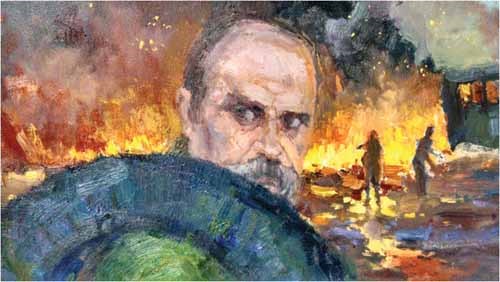Most nations have a writer whose name is virtually synonymous with culture. For Ukrainians that name is Shevchenko.
Taras Hryhorovych Shevchenko was a consummate poet, artist and activist who, for many, defined modern Ukrainian literature, and even the modern written language itself.
Peter Fedynsky, a former Voice of America journalist who worked in Ukraine believes the world deserves to know about Shevchenko.
"First of all, that he hasn't been known, you have an entire nation that reveres this man, there are twelve hundred and fifty monuments to him in Ukraine, his books have been published in 300 editions around the world, but until now only Ukrainians have known."
Fedynsky is a first generation Ukrainian-American who was born in Pennsylvania in 1951 and the translator of a new English edition of Shevchenko's seminal work, The Kobzar. Kobzar literally translates as "bard' which became Shevchenko's nickname after he originally published the book in 1840.
The translator was in Yorkton October 21 at the invitation of the local branch of the Ukrainian Canadian Congress to celebrate the 200th anniversary of Shevchenko's birth with a presentation and reading from the new volume.
Within its pages are encapsulated the epic struggle of a people yearning for freedom in a milieu of history and politics, religion and morality, poverty and affluence, work and science and family and familial duty, which Shevchenko considered to be of supreme value.
"All of these things are implicit in Shevchenko and he has the added value of a lot of just pretty literature on various topics so the world should know about him," Fedynsky said.
Translating, however, particularly poetry, has its inherent challenges since so much of the work is tied up in the language itself.
"One of the reasons, I think, that Shevchenko has not been translated into English until now is because translators have feared that," Fedynsky said. "I dispensed with it. I looked at Shevchenko's content, which is as compelling as his language is beautiful.
"I devoted all of my energy into giving my translation a rhythm, which carries throughout and it doesn't matter where you open it, you'll find that there is a rhythm. It doesn't rhyme, the way Shevchenko did, it doesn't have the meter that Shevchenko used, but it has a rhythm and the content is delivered."
It is a novel approach that plays to the strengths English.
"There is also the inherent lyricism of Ukrainian," Fedynsky said. "Ukrainian is kind of like Italian, it's a very melodic language and it uses diminutive and Shevchenko used that a lot for sarcastic effect, for sweetness, for whatever added value he wanted to give.
"Now, English doesn't have that, it's a Germanic language and it's very business-like so I used the business-like nature of English, particularly the vocabulary to deliver the rhythm that I tried to give to the book because sometimes you needed a two syllable word or a three syllable word to make the rhythm work."
At a luncheon at Mano's October 22, Fedynsky presented a copy to the Yorkton Public Library.
"A library is a very important institution anywhere at any time," he said. "It's important that every library have important works of literature and science and whatever topics that belong in that category."
Testament
When I die, then bury me
Atop a mound
Amid the steppe's expanse
In my beloved Ukraine,
So I may see
The great broad fields,
The Dnipro and the cliffs,
So I may hear the river roar.
When it carries hostile blood
From Ukraine into the azure sea...
I'll then forsake
The fields and hills-
I'll leave it all,
Taking wing to pray
To God Himself...till
Then I know not God.
Bury me, rise up,
And break your chains
Then sprinkle liberty
With hostile wicked blood.
And in a great new family,
A family of the free,
Forget not to remember me
With a kind and gentle word.



